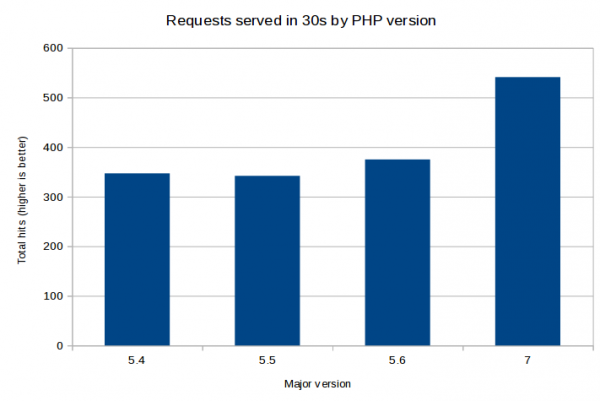One of our most requested features is for PHP 7 support. We’ve heard you loud and clear, and over the last few weeks we’ve been working to bring PHP 7 to EasyApache. I’d like to announce that it is now available in our primary EA4 repositories.
PHP 7 brings a lot of improvements to the table. One of the most notable changes are the speed improvements gained from PHPNG, the newly refactored Zend Engine in PHP 7. Some of the public benchmarks show that PHP 7 is as much as 2-3 times faster than PHP 5!

As an example, here’s a quick benchmark that we ran on PHP 7. We ran this benchmark on a public, working WordPress installation running on EasyApache 4. We tested the application to see how many requests Apache can serve in 30 seconds. PHP 5.4 through PHP 5.6 all averaged between 340 and 375 hits in 30 seconds, or roughly 12 requests per second. PHP 7 served around 540 hits, which puts it around 18 requests per second, which is roughly a 30% increase in speed. This is a fantastic result, and we’re so excited to be able to provide it to you.
Other notable PHP 7 improvements include new engine exceptions, new operators and new type hints! Also, we think that the new tie fighter operator (<=>) is pretty cool as well.
There are also many deprecated SAPIS, extensions, and functions that you need to be aware of before you rush off to upgrade to the new version. If you’ve been using PHP 5, you’ll definitely want to take note of these. Two of the biggest changes include the removal of the mysql extension and ASP-style tags. They’ve been deprecated for some time, so we hope you aren’t actually using them, but this makes it official and is something to keep in mind when you consider upgrading. You can view the full list of deprecations and changes here: https://wiki.php.net/rfc/removal_of_dead_sapis_and_exts
Another thing to keep in mind is that the major encoders and loaders that we provide are not compatible with PHP 7 right now. These include IonCube, SourceGuardian and ZenGuard. Once these are upgraded and compatible, we will implement and release them for your use in EasyApache 4. We maintain our complete list of available PHP options in our PHP Options documentation.
If you’re ready to try out PHP 7, you can simply add ea-php70 to your custom profiles, or run the yum install ea-php70 command to get the base packages.
Let us know if you have any questions or experience any trouble, and we’ll be glad to assist in any way we can.

